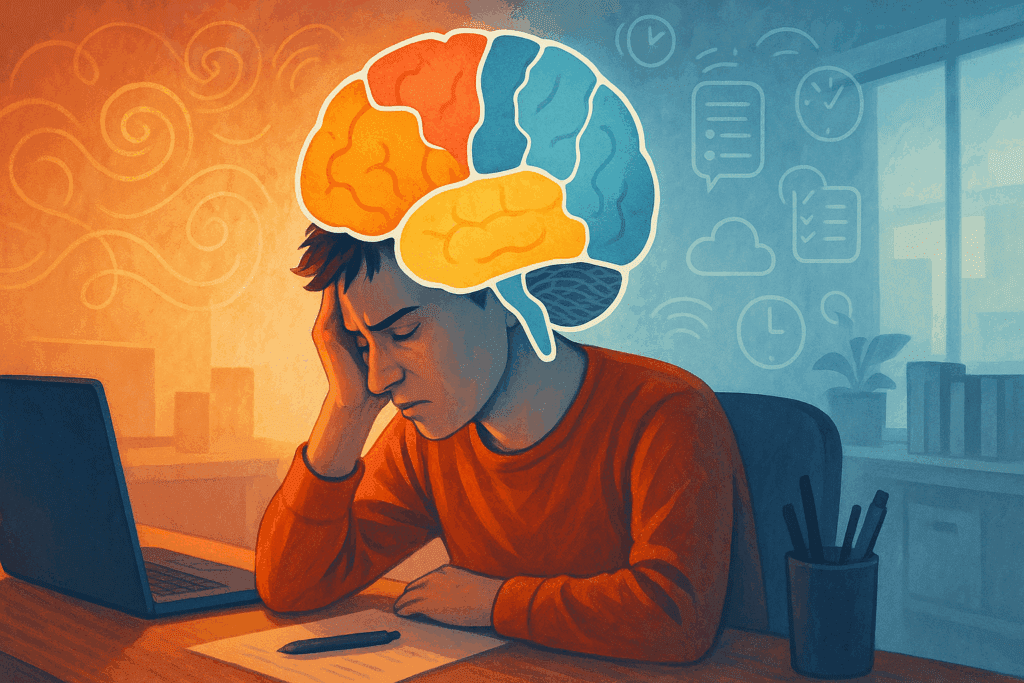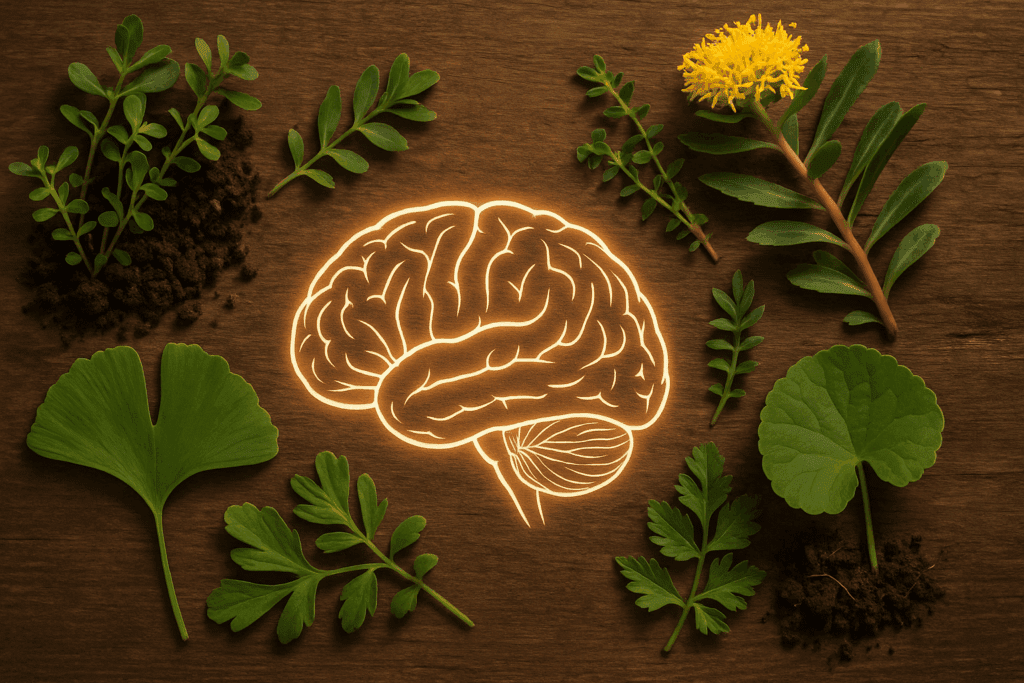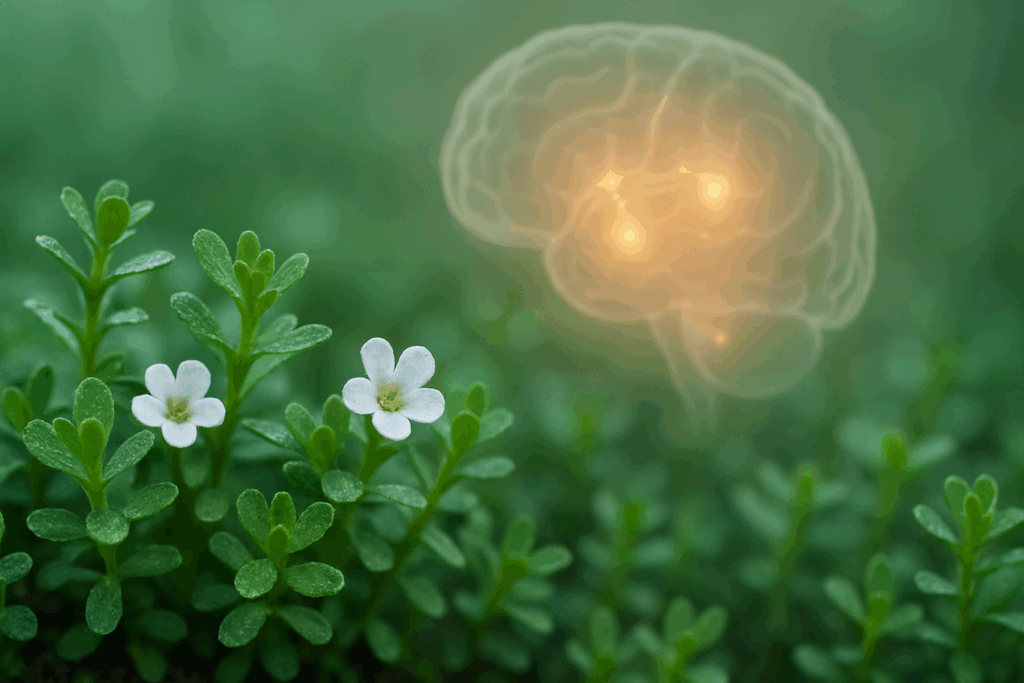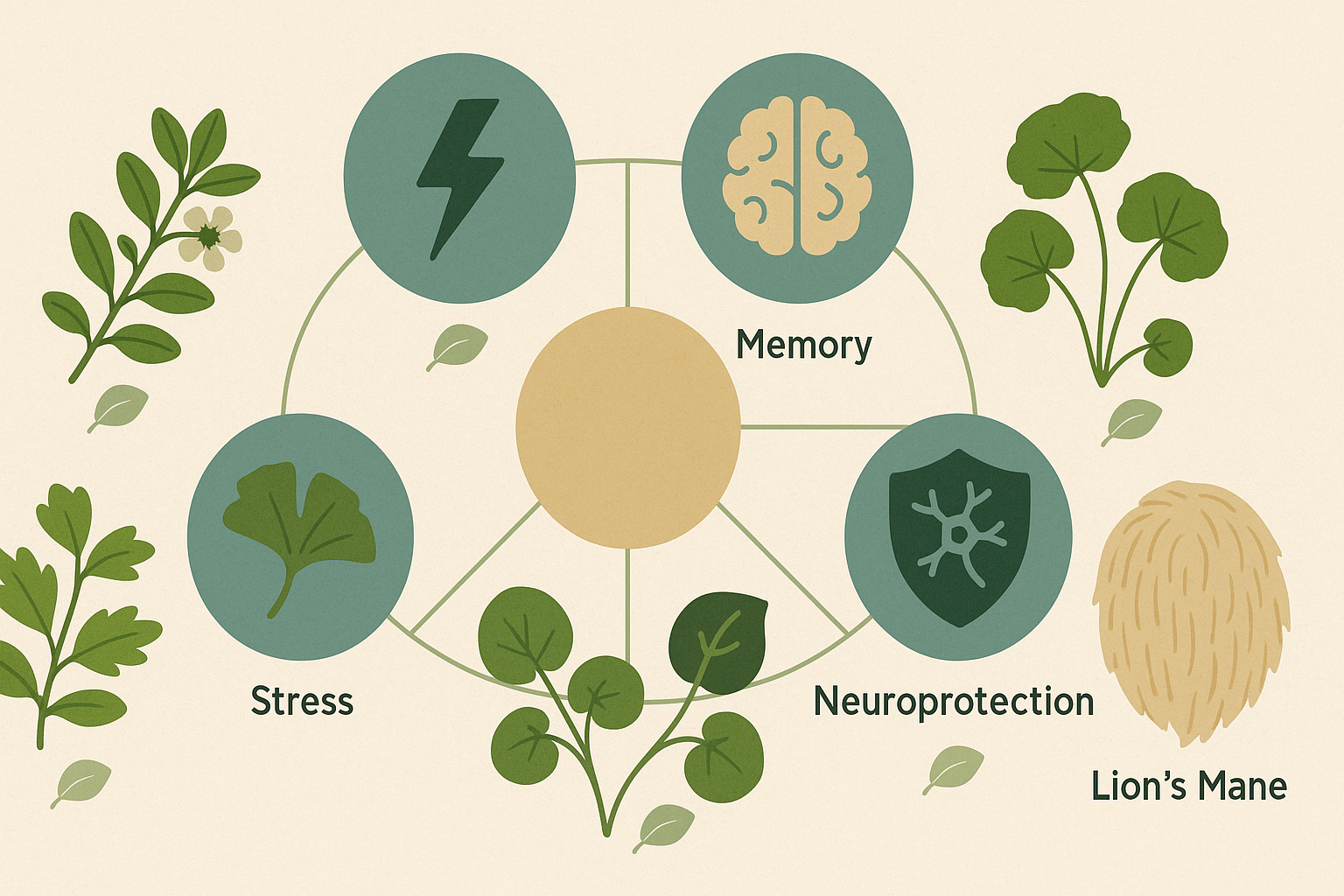In a world increasingly filled with distractions and overstimulation, individuals with ADHD often face heightened challenges that affect not only their attention but also their memory and emotional regulation. While conventional treatments like stimulant medications and behavioral therapies have helped many, a growing number of adults are now exploring natural alternatives. This shift toward holistic care is fueled by the desire for fewer side effects, a more personalized approach, and a deeper alignment with nature-based wellness. The question many are asking is this: What is the best herb for ADHD, and can it really make a difference in focus, memory, and mental clarity?
You may also like: Best Herb for ADHD Support: How Natural Remedies and Herbs for ADHD Women May Help Boost Focus and Calm
Scientific interest in herbal solutions for ADHD is not just a passing trend. It is rooted in decades of ethnobotanical research, integrative medicine, and clinical trials. As our understanding of neurodiversity expands, so too does our curiosity about plant-based compounds that may gently modulate brain chemistry. Importantly, any natural approach must be evaluated through the lens of medical accuracy, scientific credibility, and real-world effectiveness. This article dives deep into the most promising herbs backed by research, examining how they work and who may benefit from them, while also addressing related neurological symptoms such as sudden onset memory loss and random episodes of memory loss for days.

Understanding ADHD in the Modern Context
Attention-Deficit/Hyperactivity Disorder (ADHD) is a neurodevelopmental condition that affects millions worldwide. Characterized by patterns of inattention, impulsivity, and hyperactivity, it manifests differently across the lifespan. While children often show overt hyperactivity, adults may experience more subtle symptoms like restlessness, difficulty initiating tasks, and problems with memory or mental fog. This makes the condition particularly challenging to diagnose and manage in adulthood.
Emerging research suggests that ADHD may not simply be a disorder of attention, but one of cognitive regulation. Neuroimaging studies have highlighted differences in brain regions associated with executive function, such as the prefrontal cortex and basal ganglia. Neurochemical imbalances, particularly involving dopamine and norepinephrine, are also central to ADHD pathology. These insights underscore the importance of addressing ADHD from multiple angles, including diet, lifestyle, and potentially, herbal supplementation.
In some cases, ADHD-like symptoms are complicated by episodic cognitive disturbances. Some individuals report sudden onset memory loss or describe random episodes of memory loss for days, which can be deeply distressing. While not always directly caused by ADHD, these symptoms can overlap and contribute to the overall experience of cognitive dysfunction. Understanding how natural remedies may impact both attentional and memory-related challenges is therefore crucial.
The Role of Herbs in Cognitive and Neurological Support
For centuries, herbs have been used in traditional medicine systems to support mental clarity, emotional balance, and brain health. In Ayurveda, Traditional Chinese Medicine (TCM), and indigenous healing traditions, plants were often the first line of treatment for conditions we now associate with ADHD. With modern scientific tools, researchers have begun to validate some of these ancient practices, providing empirical support for their cognitive-enhancing effects.
Herbs that show potential for ADHD typically act through one or more mechanisms: modulating neurotransmitters, reducing inflammation, improving blood flow to the brain, or supporting neurogenesis. Unlike pharmaceutical stimulants, which often act quickly and powerfully, herbal remedies tend to work more gradually, requiring consistent use over time. However, this slower profile can be advantageous, offering fewer side effects and more sustainable benefits.
It is also worth noting that herbs are not a panacea. Their efficacy can depend heavily on individual biology, dosage, quality of the extract, and coexisting health conditions. That said, for those seeking a more natural path to focus, memory, and mental clarity, the following herbs represent some of the most promising options available.

Bacopa Monnieri: The Memory Herb of Ayurveda
One of the most studied herbs for cognitive support is Bacopa monnieri, also known as Brahmi. Used for centuries in Ayurvedic medicine, Bacopa is revered for its ability to enhance memory, reduce anxiety, and promote intellectual clarity. Modern research supports its use, particularly in individuals with cognitive impairments and attention deficits.
Bacopa contains active compounds called bacosides, which are believed to improve synaptic communication and protect neurons from oxidative stress. Several clinical trials have shown that regular supplementation with Bacopa may improve attention, working memory, and information processing speed. These effects make it a compelling candidate for those managing ADHD symptoms or coping with random episodes of memory loss for days.
In addition to its memory-enhancing effects, Bacopa has adaptogenic properties, helping the body and mind adapt to stress. This is particularly relevant for individuals whose ADHD symptoms are exacerbated by anxiety or emotional dysregulation. Bacopa’s gentle calming effect does not induce sedation, making it suitable for daytime use and ongoing cognitive maintenance.

Ginkgo Biloba: Enhancing Blood Flow and Cognitive Function
Ginkgo biloba, derived from one of the oldest tree species on Earth, has long been used to enhance brain function. Its most recognized benefit lies in its ability to increase cerebral blood flow, thereby delivering more oxygen and nutrients to brain cells. This is crucial for maintaining mental clarity and focus, particularly in aging populations or those experiencing cognitive decline.
Studies suggest that Ginkgo may also support memory formation and attention span, potentially aiding individuals with ADHD or those suffering from sudden onset memory loss. One theory is that by improving microcirculation in the brain, Ginkgo facilitates faster and more efficient neural communication. This may be especially helpful for those who experience episodes of brain fog or cognitive fatigue.
While Ginkgo is generally well tolerated, it is important to use it under medical supervision, particularly for individuals on blood thinners or with bleeding disorders. For the right person, however, Ginkgo can be a potent ally in the quest for sharper mental performance and emotional equilibrium.
Rhodiola Rosea: The Adaptogen for Mental Resilience
Rhodiola rosea is a flowering plant native to cold regions of Europe and Asia, and it has been used for centuries to increase endurance, reduce fatigue, and sharpen mental performance. As an adaptogen, Rhodiola helps the body regulate stress hormones, particularly cortisol, which is often elevated in individuals with ADHD.
Research has shown that Rhodiola can improve symptoms of burnout, enhance concentration, and support cognitive flexibility. These attributes are particularly beneficial for ADHD sufferers, who often struggle with task-switching, emotional lability, and focus-related fatigue. Moreover, Rhodiola’s ability to modulate serotonin and dopamine pathways adds to its appeal as a natural cognitive enhancer.
Interestingly, individuals who suffer from random episodes of memory loss for days may find Rhodiola beneficial for stabilizing mood and energy levels, both of which play a role in memory consolidation. By promoting a more balanced neurochemical environment, Rhodiola may help reduce the frequency or severity of memory lapses associated with stress or mental overload.
Gotu Kola: Nerve Tonic and Brain Rejuvenator
Another herb with strong roots in Ayurvedic medicine is Centella asiatica, commonly known as Gotu Kola. Traditionally used to rejuvenate the brain and nervous system, Gotu Kola is often prescribed for mental fatigue, poor memory, and nervous disorders. It is believed to stimulate the growth of new neurons and enhance synaptic plasticity.
Modern studies support Gotu Kola’s role in promoting neurogenesis, especially in the hippocampus—a brain region critical for memory formation and spatial awareness. For individuals experiencing sudden onset memory loss or unpredictable memory lapses, Gotu Kola may offer both restorative and preventative benefits.
In addition to its neurological effects, Gotu Kola possesses anti-inflammatory and anxiolytic properties, which can further support mental clarity in individuals with ADHD. Its gentle nature and low toxicity make it a safe option for long-term use, especially when combined with other synergistic herbs in a holistic regimen.

Frequently Asked Questions (FAQ) – Best Herb for ADHD and Natural Cognitive Support
What are some unexpected lifestyle triggers that can mimic ADHD symptoms and worsen memory lapses?
Certain environmental and lifestyle triggers—such as poor sleep hygiene, irregular meal timing, excessive screen exposure, and chronic low-grade stress—can mimic or exacerbate ADHD-like symptoms. For example, a disrupted circadian rhythm may impair cognitive processing and lead to what appears to be sudden onset memory loss. Likewise, extended multitasking and digital overload can create confusion that resembles random episodes of memory loss for days. These issues often go undiagnosed and may be mistakenly attributed solely to ADHD, leading to mismanagement. Identifying and addressing these external triggers can be an important part of a comprehensive approach to cognitive health, particularly when exploring natural remedies.
Can nutritional deficiencies contribute to sudden onset memory loss in people with ADHD?
Yes, nutritional imbalances—especially deficiencies in B vitamins, magnesium, omega-3 fatty acids, and zinc—are often overlooked but can significantly affect memory and concentration. A sudden drop in essential micronutrients can manifest as acute forgetfulness or attention issues, sometimes misinterpreted as random episodes of memory loss for days. In ADHD populations, these deficiencies may exacerbate baseline cognitive challenges, amplifying emotional reactivity or focus-related fatigue. Supplementing key nutrients while also using herbal support like Bacopa or Lion’s Mane may provide more comprehensive benefits. However, professional testing and guidance are essential to avoid excessive supplementation and to ensure safety.
Is there a connection between stress hormones and memory issues in ADHD?
Elevated cortisol levels from chronic stress can directly impact the hippocampus, the brain’s primary memory center. Individuals with ADHD often have dysregulated stress responses, making them particularly vulnerable to stress-induced memory dysfunction. In this context, random episodes of memory loss for days can be partially explained by hormonal fluctuations interfering with neural plasticity. Herbs such as Rhodiola rosea are valuable because they not only support attention but also buffer the nervous system against cortisol’s damaging effects. Combining stress-reduction techniques like mindfulness with adaptogenic herbs may help restore cognitive resilience over time.
How do herbs like Gotu Kola support long-term nervous system repair?
Gotu Kola is rich in triterpenoids and other compounds that stimulate neurogenesis and repair damage to nerve cells. Unlike herbs that provide only symptomatic relief, Gotu Kola has regenerative properties that make it particularly suited for individuals experiencing sudden onset memory loss. It helps improve circulation and reduce neuroinflammation, two factors known to impair memory encoding and recall. Over time, its cumulative effects may reduce the frequency of random episodes of memory loss for days. This makes Gotu Kola not just a cognitive enhancer but a long-term nerve tonic for brain longevity.
Are herbal blends more effective than single-herb solutions for ADHD?
While single-herb supplements like Bacopa or Ginkgo can yield benefits on their own, carefully formulated blends often provide a synergistic effect. Combining herbs with complementary actions—such as one that enhances focus and another that reduces stress—can offer a broader spectrum of cognitive support. For instance, pairing Lion’s Mane with Rhodiola may be especially helpful for those dealing with both attention deficits and random episodes of memory loss for days. Additionally, certain compounds enhance the bioavailability of others, which can amplify the effectiveness of the overall blend. However, these combinations should be designed with professional oversight to ensure efficacy and safety.
Can sudden memory lapses be a warning sign of something more serious than ADHD?
Yes, while occasional forgetfulness can accompany ADHD, repeated or random episodes of memory loss for days should never be dismissed without proper evaluation. Such symptoms may indicate underlying neurological conditions, hormonal imbalances, or even side effects from medications or toxins. Sudden onset memory loss, especially when it disrupts daily functioning, warrants prompt clinical investigation. Using herbs without ruling out more serious causes may delay necessary treatment. It’s crucial to pair natural interventions with thorough diagnostic protocols to ensure comprehensive care.
How might women’s hormonal cycles affect the efficacy of herbal treatments for ADHD?
Fluctuations in estrogen and progesterone levels can significantly alter neurotransmitter activity, influencing both the experience of ADHD symptoms and the response to herbal treatments. Some women report heightened sensitivity to herbs during certain phases of their menstrual cycle, while others find that memory challenges worsen premenstrually. For example, sudden onset memory loss or brain fog may align with luteal-phase hormonal drops. Tailoring herbal regimens around these cycles may improve outcomes and minimize side effects. Working with a functional medicine practitioner can help personalize protocols that align with hormonal rhythms.
What role does sleep play in random episodes of memory loss for days?
Sleep is foundational to memory consolidation and emotional regulation. In individuals with ADHD, disrupted or insufficient sleep can exacerbate both attentional issues and short-term memory problems. More significantly, chronic sleep disturbances may lead to seemingly random episodes of memory loss for days, particularly when deep sleep cycles are frequently interrupted. Certain herbs like Valerian root or Ashwagandha may improve sleep quality and indirectly benefit cognitive performance. Addressing sleep hygiene should be a central part of any strategy aimed at restoring mental clarity.
Can digital detoxing enhance the effects of herbal interventions for ADHD?
Reducing digital overstimulation—especially from social media, rapid-fire news, or multitasking apps—can significantly enhance the brain’s receptivity to herbal interventions. Constant digital engagement taxes executive function and short-term memory, potentially mimicking or intensifying ADHD-like symptoms. When paired with herbal support, digital detoxing may reduce stress hormones, improve focus, and lessen the risk of sudden onset memory loss. Realigning the brain’s reward circuitry through offline activities allows herbs like Ginkgo or Rhodiola to work more effectively. As part of a holistic plan, limiting screen time can yield measurable improvements in cognitive performance.
How soon can individuals expect to see results from natural herbs for ADHD and memory?
Unlike pharmaceutical stimulants that act within hours, herbal remedies often require several weeks of consistent use before noticeable benefits emerge. This delay is due to their gentler action and the time required to achieve sufficient bioaccumulation in the body. For individuals experiencing random episodes of memory loss for days, this means that patience and adherence to dosage are critical. Some users may see incremental changes in sleep, mood, or focus before improvements in memory become apparent. Working with a practitioner to monitor progress can help optimize results and adjust the regimen as needed.

Lion’s Mane Mushroom: A Nootropic Powerhouse
Among the newer entries into the natural nootropic space is Hericium erinaceus, or Lion’s Mane mushroom. This edible fungus has gained attention for its unique ability to stimulate the synthesis of Nerve Growth Factor (NGF), a protein essential for the survival and maintenance of neurons.
Lion’s Mane has been studied for its potential to improve cognitive function, reduce symptoms of depression and anxiety, and protect against neurodegeneration. These effects are particularly valuable for individuals dealing with chronic mental fatigue, memory lapses, or the emotional volatility often seen in ADHD. By promoting brain plasticity and neuronal repair, Lion’s Mane supports a more resilient nervous system.
Some anecdotal evidence also points to Lion’s Mane being helpful for those with random episodes of memory loss for days, especially when used in conjunction with memory-training exercises and a supportive diet. Its synergistic effects with other herbs like Bacopa or Ginkgo may further amplify its cognitive benefits, making it an essential part of any plant-based protocol for brain health.


